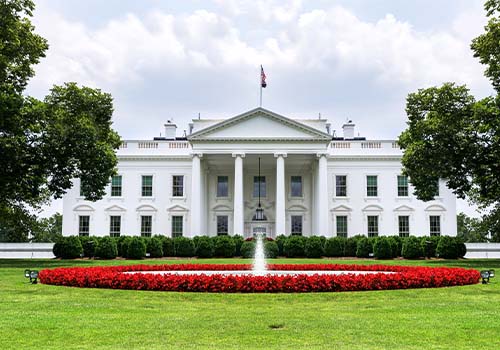
You may be curious about whether a convicted felon can run for President. Perhaps you’re wondering, “can someone with a criminal record contest for the highest position in the country?” The simple answer to the question is yes. No part of the Constitution prevents a convicted felon from running for President.
However, such a candidate will have to overcome many barriers. The opposition will capitalize on this issue and attempt to gain public support therefrom. Consequently, gaining public confidence will be challenging for a felon who intends to run for the presidency. Public office aspirants need electors to believe in their cause.
Even if a felon manages to become the President, there is always a threat of impeachment from Congress. Nevertheless, this guide will explain everything you need to know about a felon becoming the President of the United States.
Table of Contents
Presidential Election Process

The presidential election process is straightforward to understand. To become the President, an aspirant needs support from various groups, including their political party, local community, and the general electorate. The process can be grouped as follow:
- Primaries and Caucuses
- National Conventions
- General Elections
- Electoral College
— Primaries & Caucuses
The Presidential election process starts in February of the election year with the primaries and caucuses, where parties select their candidates. Primaries are usually open voting where state delegates decide who will represent their party in the upcoming presidential elections. Caucuses come before the primary election and involve discussions as well as votes.
— National Conventions
Following the primaries, national conventions will happen across different places. Each party holds a convention for the selection of its presidential candidate.
Consequently, delegates will vote for their favorite candidates. The candidate with the highest number of votes secures the party’s presidential ticket. At the convention, the presidential candidate selects a running mate who will become the vice president if they win the election.
— General Election
After winning their party’s ticket, presidential aspirants will tour the country to garner support for their campaign and raise funds. Then, when the general election takes place in November, voters go to the polls to vote for their preferred presidential candidates.
When Americans cast their votes during the general election, they vote for a group known as electors. In 48 states and Washington D.C., all the state electors will later vote for the candidate with the most votes in their states. Maine and Nebraska use a proportional system.
— Electoral College
This is the final step in the process. In December, all 538 electors cast their votes for the candidates who won in their states. The number of electors from each state is proportional to the state’s population. Any candidate that gets more than half of the votes (270) wins the election.
Requirements To Become President Of The United States
To become the President of the United States, there are three main requirements. Federal laws stipulate that aspirants must possess all three before they can be eligible to contest for office. Below are the required qualifications:
- Be a natural-born citizen of the United States
- Be at least 35 years old at the time
- Must be a resident of the United States for more than 14 years
These three requirements indicate that a convicted felon can contest to become the President of the United States despite their record. However, the absence of legal impediments doesn’t mean such an individual will not face political challenges.
Various factions have attempted to include more requirements to screen aspirants for the topmost position in the country. However, all of these attempts have been unsuccessful. In many situations, such attempts are seen as moves to disqualify certain candidates from the presidential race. Therefore, the Supreme Court has ruled against attempts to introduce new requirements for Presidential candidates.
It’s crucial to note that while the federal requirements to run for political offices are simple, the state requirements aren’t straightforward. For example, various states have laws barring people with criminal convictions from running for office. Texas and Georgia have some of the most stringent rules, especially on crimes against moral turpitude.
Can A Convicted Felon Run For President?

Yes, a convicted felon can run for President once they meet the fundamental requirements. The Constitution only stipulates three requirements: citizenship, age, and residency. Anyone who meets them can contest to become the President of the United States.
Since the Constitution clearly defines who can become the President, no other law can prevent a qualified person from contesting for office. It will take a constitutional amendment to change the current eligibility criteria.
Nevertheless, some barriers exist for a convicted felon. Legal barriers include the inability of a felon to vote in most states. Only two states, Maine and Vermont, allow prisoners to vote. Other states have some measures of restriction on the voting rights of felons. However, in 14 states, including Hawaii, Utah, New York, and Massachusetts, felons earn their voting rights after completing their prison terms successfully.
In 22 states like Texas and New Jersey, felons must be fully cleared from their prison terms and parole before they can vote again. However, 12 states, including Alabama and Arizona, remove felons’ rights to vote for life. As a result, only felons who are pardoned can vote again. Others get their voting rights removed for life. Efforts to have a federal law on voting rights for prisoners have been abortive to date.
Another reason it may be impossible for a convicted felon to run for President is the limitation posed by incarceration. A person in prison will be incapable of performing the duties of the President of the United States.
Felony Classes: Charges & Penalties
In the United States of America, felonies are categorized into five classes. They are felony Class A to Class E. Some states use figures for the classes, but the degrees are the same, with A being the most serious to E being the least serious. Here is all you need to know about each class of felony.
— Felony Class A
Class A felonies are also referred to as Class 1 or Level 1 felonies. These are usually the most serious offenses, including first-degree murder, aggravated rape, first-degree kidnapping, and assault with a deadly weapon.
The penalties for Class A felonies vary depending on the state’s penal code. Some states sentence Class A felons to life imprisonment or the death penalty. Others designate high prison terms like 30 or 40 years for such offenses. Penalties may also be stipulated within a range such as 10 to 99 years. Judges consider various factors to determine the structure of a felon’s sentence.
— Felony Class B
Class B, Class 2, or Level 2 felonies are just a degree below the most serious offenses. However, they are also grave offenses and attract long prison terms. A Class B felon can receive up to 60 years prison term, especially if the person is a repeat offender.
Factors the judge will consider during sentences include using a deadly weapon, hate crimes, gang crimes, and sex crimes involving children or crimes involving a vulnerable victim.
— Felony Class C
All states have their separate ways of classifying offenses. Thus, an offense that is a Class C felony in one state may be Class B or a misdemeanor in another. The penalties will equally reflect the degree. For states that use the five Class system, Class C felonies can attract between ten and 25 years imprisonment. Many states also levy fines on Class C felonies.
— Felony Class D
Class D or Level 4 felonies can also change classification depending on the state. The charges involve felonies that are less serious than those punished with lengthy imprisonment. Class D felons serve between 5 to 10 years in prison. They may also have to pay fines as part of their sentence.
— Felony Class E
Class E felonies are the least serious offenses in the felony category. Federal and state laws categorize offenses as either felonies or misdemeanors. Offenses classified as Class E felonies are the least serious of felonies. They usually attract prison terms between one to five years. They are also less likely to affect the political career of a felon compared to Class A or B felonies.
Since classes of felons attract different degrees of punishment, the way felons are treated can sometimes be different. For example, some states are more lenient with felons in lower class categories than those from higher classes. In addition, the way classes affect felons may include whether they are allowed to vote and run for public offices after completing their sentence.
What Is The Probability Of A Convicted Felon Becoming President?
This is where it all gets interesting. A convicted felon can run for office but has no guarantee of success. There is little probability that a convicted felon can become the President, especially given that no convicted felon has yet managed to win the presidential elections.
Three convicted felons have attempted to become the President in the history of the United States. The first is Eugene Debs, who ran for President from a federal prison in 1920. Debs was convicted of violating the Espionage Act of 1917 due to his anti-war speech. Debs was against World War I and instigated people to protest against being drafted into the war. Unfortunately, he lost the candidacy to William Harding after winning only about 3% of the vote.
The next person to try running for President from prison was Lyndon LaRouche in 1992. LaRouche was in prison for mail fraud and tax evasion. He won less than 0.1% of the primary votes and never got close to being the President. Lastly is Keith Judd, who, in 2012, won 41% of the votes against incumbent President Barack Obama in West Virginia’s Democratic primary. He also never got close to being elected.
Now that the former President, Donald Trump, is facing potential felony charges after making it clear that he intends to run for office again in 2024, this probability has increased. Trump still has the support of most of the Republican congress members. However, his bid for return may be marred by a criminal record if the jury finds him guilty and indicts him.
Hence, the probability of a convicted felon becoming President is low. No felon has managed to secure a party’s ticket to represent them in the Presidential election. However, any eligible citizen of the United States can legally run for President.
The Bottom Line
The road to the presidency is a long and arduous one. An aspirant needs to gain support from all relevant stakeholders to succeed. Unfortunately, it is difficult for someone with a criminal record to gain enough support from appropriate parties. Therefore, people with felony charges against them tend to fizzle out before the race gets tough.
One indisputable fact is that a convicted felon can run for President in the United States. The U.S. Constitution is clear on the requirements for presidents. The challenge is that a felon will experience difficulty gaining public support while staunching opposition from rivals.
Frequently Asked Questions
How long does a felon have to wait before they can run for President?
The time a felon has to wait before they can run for President is dependent on their state. State laws do not constrain presidential candidates. But since candidates have to gain their state’s support to win, many obey the state’s limitations. Some states grant felons the freedom to run for public office once they serve their punishment. In some states, felons must be cleared by a judge, and it is only after their clemency that they can contest political positions.
In states like Georgia, felons must wait ten years after completing their prison term before they can run for office. The time frame does not start after sentencing but after completing the full sentence. So if a qualified citizen wants to run for President 10 years after being released from prison, he will be eligible to do so. However, his criminal term will be on his public record, which will be available for scrutiny.
Some states do not permit felons to run for office, even after completing their sentences. Only those who are pardoned can vote and run for office. Since pardons are rare, many convicted felons cannot run for public offices throughout their lifetime. The governor may issue a pardon to a convicted felon, but only the President can issue clemency if it is a federal offense.
This authority used to be shared with the Secretary of State and the Attorney General. Convicted felons can visit justice.gov to get answers to their questions about a presidential pardon.
Who was the first U.S. president to be elected with a criminal record?
There has never been a U.S. president with a criminal record. Felons have attempted to run for President in the past, but none was successful. There have also been charges against some presidents while they were in office. However, none of these indictments have resulted in a successful conviction against a serving President.
Former Presidents Andrew Johnson and Bill Clinton were the closest a U.S. president got to being convicted. The former was accused of violating the Tenure of Office Act after serving a term of 4 years in conjunction with the remaining two years of Abraham Lincoln’s tenure. The latter was accused of perjury after denying his infamous affair with Monica Lewinsky. Both were impeached by the house of representatives but escaped conviction by the senate.
If Donald Trump becomes convicted of the criminal charges against him, he will be the first U.S. president to have a criminal record. It is unclear if he will be able to contest successfully in 2024 with a criminal conviction. However, if he can secure the Republican presidential ticket, there will be no legal restriction to stop him.
Can a president serve three terms?
The answer to this question is no. A president cannot serve three terms in the United States, whether consecutive or not. The 22nd Amendment clearly states that a president can only serve two terms of four years each. After completing the second term, a President becomes ineligible to contest for office again.
The 22nd Amendment also states that a person who has acted as the President under another person’s term for more than two years is only eligible for a single term in office. This Amendment came about after President Franklin D. Roosevelt was elected for a fourth term. Till now, he has been the only President who served three terms and will be the only one ever to do so. Every attempt to serve more than three terms by the likes of Woodrow Wilson, Ulysses Grant, and Theodore Roosevelt was dashed.
Can a felon run for state-level office?
It is increasingly difficult for felons to run for state-level offices than federal offices. States set their laws on who can run for offices within their jurisdiction. Some states have stricter laws than others. Texas, for instance, does not permit people convicted of serious felonies to become elected officials. These offenses include Class A or B felonies like murder, rape, assault, and hate crimes. However, those convicted of lesser crimes like Class D or E felonies can run for office some years after completing their sentences.
It is worth noting that a person charged with a misdemeanor will most likely be able to gain support than someone convicted of a felony. The former can show that he has changed and is working on becoming a better person. He can also engage in community service and contribute to local charities to improve his popularity among the electorates. By the time the elections come around, the criminal record will likely not be a vulnerability waiting to get exploited.
